Characters present in both the 1927 silent film Metropolis and in the Thea von Harbou's original novel of the same name.
Warning: Unmarked spoilers below.
The Upper Class
The Upper Class in general
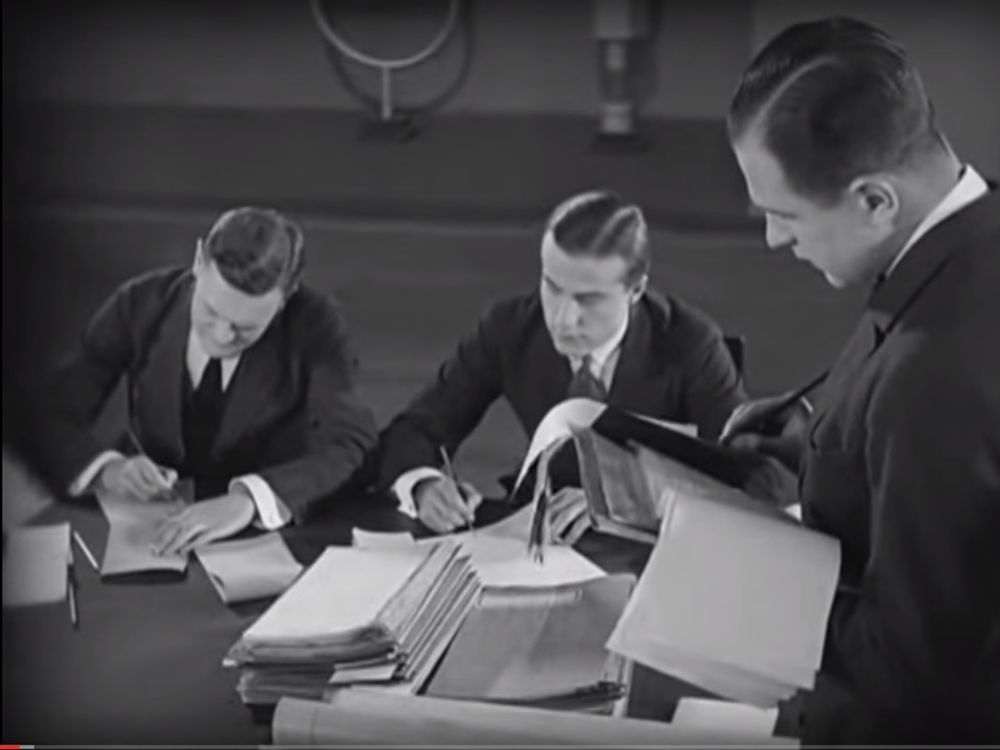
- Accomplice by Inaction: How the workers feel about them.
- The Hedonist: Most of the rich people, who don't seem to have any real jobs and spend most of their time partying.
- Mr. Fanservice: The runners at the stadium, who are all shirtless.
- Sharp-Dressed Man: They often wear black business suits.
- The Beautiful Elite: Most of them are quite good-looking.
- Punch-Clock Villain: Many of them are simply people who want to earn a paycheck, and don't know or care about the fact that they are a part of an oppressive class society.
- Unwitting Pawn: The False Maria is manipulating them just as easily as she manipulates the workers.
- Upper-Class Twit: Most members of the upper class seem to be this.
- What Happened to the Mouse?: Every unnamed upper class member seem to disappear at the end of the film, even the large crowd of partygoers who hung out with Futura. It's possible that most people stayed inside because of the power outage and the rioting workers, and that Futura's entourage were scared away/knocked unconscious/killed by the workers.
Freder Fredersen / Eric Masterman
- Played by: Gustav Fröhlich
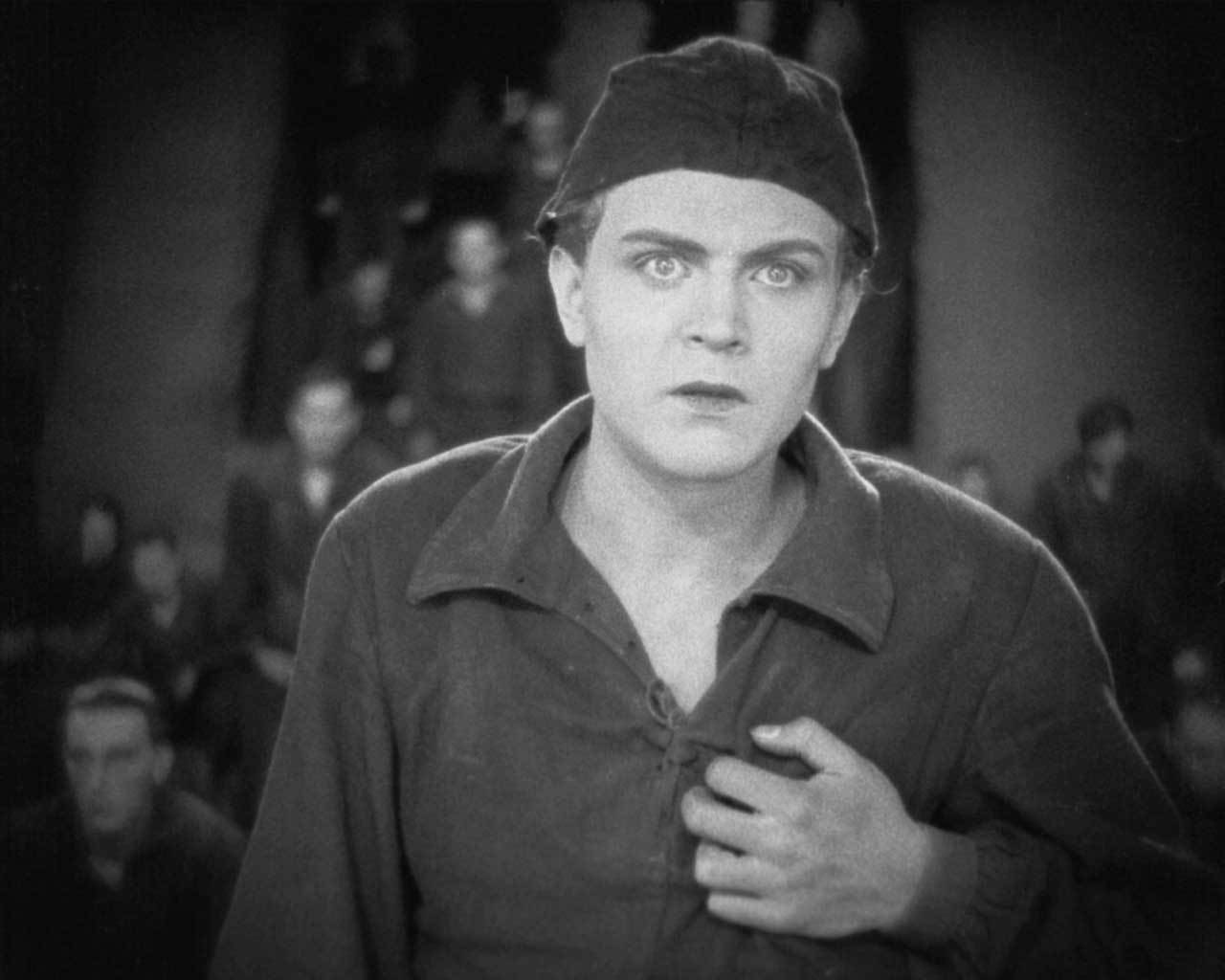
The son of the master of Metropolis. He is blissfully unaware of what goes on underneath the city, until he gets to experience it first-hand and decides to do something about it.
- Adaptational Heroism: In the novel, Freder was an Anti-Hero struggling with his own morality who attacked his father in a fit of rage, but regretted it immediately. In the movie, he is unambiguously good.
- Alliterative Name: A more subtle example, as his full name is never stated. However, it is implied that it is "Freder Fredersen."
- Cassandra Truth: None of the workers (except maybe Georgy) believe him when he says that Maria has been replaced by an imposter. In the novel, Grot doesn't believe him at first when he claims that the workers' children have been saved, either.
- Determinator: Never worked a day in his life but successfully completes one of the hellish ten hour shifts of the workers when he substituted for one of them.
- Dub Name Change: The Pollock version changed his name to "Erik."
- Gadgeteer Genius: It's stated in the book that he spends most of his time in his workshop, where he is building some kind of machine. This aspect of him was removed in the movie.
- The Heart: He becomes the mediator, who is outright called this in the story's Arc Words.
- Hero with Bad Publicity: He is attacked by the workers and, in the novel, Grot for being Joh Fredersen's son.
- Idle Rich: Starts out this way, enjoying the Club of the Sons as much as all the other privileged young men, but soon takes a real interest in the workers' welfare and starts trying to help them.
- Incoming Ham: "YOU ARE NOT MARIA!"
- Large Ham: He is a protagonist in a silent film, after all.
- Love at First Sight: He pretty much falls in love with Maria as soon as he sees her.
- Mad Oracle: He comes off a bit like this, due to his constant thematically appropriate visions and rather Hot-Blooded nature.
- Mad Scientist: Though unlike Rotwang, this doesn't have any huge impact on the plot, and it was completely removed in the film with no major changes to the story.
- Messianic Archetype: Comes complete with a Crucified Hero Shot.
- Sanity Slippage: He has a somewhat disturbing tendency to hallucinate.
- Pygmalion Plot: His love for the machine he built in the book borders on Machine Worship, to the point that he feels like he is cheating on it when he falls in love with Maria. This is despite the fact that it apparently looks more like a Mechanical Horse than a human, and that he hasn't even activated it yet.
- Reluctant Psycho: In the novel, he genuinely starts to worry about his own sanity when he assaults his own father after seeing him embrace what he thinks is Maria.
Josaphat / Joseph
- Played by: Theodor Loos

An assistant working for Joh Fredersen and a close friend of Freder. After Fredersen fires him, he agrees to help with Freder's effort to learn more about the workers' world.
- Better to Die than Be Killed: He would rather die by his own hand than work himself to death at a machine.
- Beware of the Nice Ones: Normally, he is a very friendly man, but he can get really angry if you push him too far. In the book, this extends to killing people in cold blood.
- Big Damn Heroes: He and Freder save the workers' children by helping them break through a gate.
- Dub Name Change: The Pollock version changed his name to "Joseph."
- Heterosexual Life-Partners: He and Freder are this. Probably.
- Interrupted Suicide: He tries to take his own life to avoid being sent down to the workers' city, but Freder stops him.
- Janitor Impersonation Infiltration: He disguises himself as a common worker to hide from the Thin Man.
- The Lancer: He is this to Freder.
- No-Sell: He refuses to accept any of the Thin Man's bribes, as that would mean betraying Freder.
- Taking a Third Option: After losing his job, he decides to shoot himself in the head rather than becoming a worker. Fortunately, Freder saves him from both fates by hiring him himself instead.
- Undying Loyalty: Again, he has this towards Freder. Probably justified by the fact that Freder hired him after he was fired by Joh Frederson.
Joh Fredersen / John Masterman
- Played by: Alfred Abel

The ruler and creator of Metropolis. He sees Maria and her followers (including his own son) as a threat, and wants to stop them at any cost.
- Adaptational Heroism: On one hand, his goals are less destructive in the movie than in the book. He is only trying to strike down against a revolution, not destroy the city. The city is still damaged by the workers' attack, but this doesn't seem to be a part of his plan, judging by his reaction. He isn't trying to use Gaslighting on his son, either.
- His counterpart in the Pollock translation takes this further. Here, he only wants to use The False Maria as a Propaganda Machine, meaning that the rebellion is all her doing. Later, he orders Grot / Number 7 to hold off the workers and capture the robot, not to open the gate for them as he originally did.
- Adaptational Villainy: On the other hand, his goals are more selfish in the movie, as he is only trying to stay in charge, rather than improving his society. He also doesn't get as much Character Development, making it more ambiguous if his Heel–Face Turn is genuine. The removal of the Hel subplot in the Pollock version can also make him come off as less sympathetic.
- Ambiguously Human: In the book, he has become a case of this In-Universe, with some people even seeing him as a god.
- The Atoner: In the novel, he becomes this after his Heel–Face Turn.
- Big Bad: He is the main antagonist for most of the story.
- Death Glare: Gives one to Josaphat shortly before firing him.
- Disease Bleach: Exaggerated. His hair goes from black to white in a matter of minutes when he sees his son fight Rotwang on the roof of the cathedral. Doubles as an Expository Hairstyle Change, as this also shows the final step in his Heel–Face Turn.
- Dub Name Change: The Pollock version changes his name to "John Masterman."
- Even Evil Has Loved Ones: For all his faults, he genuinely cares about his family.
- Easily Forgiven: Played With. When the workers find him and realise who he is, they are pissed at him. However, once they find out that their children are still alive they seem to forgive him instantly, even though it was partly his fault that they were in danger, and he didn't do anything to save them either. Not to mention that he was also responsible for their terrible living and working conditions, and for kidnapping Maria and replacing her with an impersonator.
- Not quite as much in the book, where Fredersen is worried that he might become Reformed, but Rejected. Though the fact that the workers are willing to give him a second chance by letting him stay in charge might be an example of this trope in and of itself.
- Exact Words: As part of his Gaslighting, he tells Freder that "there was neither a woman nor any other living soul" in the room. A Ridiculously Human Robot is technically neither.
- Gaslighting: He does this to Freder in the book by saying that there was no girl in the room and that he was just imagining things. His goal is just to make Freder forget about it, but unfortunately it convinces Freder that he can't tell the difference between fantasy and reality, which doesn't do wonders for his mental health.
- Heel Realisation: He realises the error of his ways when he accidentally places himself in the exact same position as the workers by putting both his own son and their children in deadly danger.
- The Needless: In the novel, it is said that he never seems to eat, drink or sleep. How he accomplishes this isn't stated, but it does make some people wonder if he is even human.
- Non-Action Big Bad: Subverted. He seems like he would be this, given that he is a middle-aged, suit-wearing industrialist who lets his cronies do all the work. However, upon hearing Rotwang's gloating to Maria, Fredersen breaks into the house and overpowers the inventor — who would later give the much younger and more muscular Freder a run for his money on the cathedral roof.
- Restart the World: In the novel, he wants to do this on a smaller scale with the city of Metropolis. Interestingly enough, he is trying to destroy his own idea of an utopia so that his son Freder, the hero of the story, can turn it into a paradise.
- The Stoic: The emotions he does show are quite subtle. Especially compared with the rest of the cast.
- Not So Stoic: During the climax of the film, he shows some rather intense emotions. He gets furious at Grot for disobeying his orders, and breaks down completely during his Trauma Conga Line. Doubles as O.O.C. Is Serious Business.
- Utopia Justifies the Means: This trope pretty much sums up his philosophy.
- Villainous Widow's Peak: He sports one.
- Well-Intentioned Extremist: He genuinely thinks that he is doing what is best for the workers by locking them up underground and forcing them to work themselves to death.
C.A. Rotwang
- Played by: Rudolf Klein-Rogge

An inventor with a questionable morality and sanity. He is willing to work for Joh Fredersen, but is still mad at him for having a relationship with his lover, Hel, many years ago who died giving birth to Freder.
- Adaptational Villainy: He was already a villain in the novel, but he didn't go as far as trying to destroy an entire city full of innocent people.
- Adaptational Heroism: The Pollock version instead gave him this by having him say that he had lost control over his creation, meaning that his robot (and Mr. Masterman's poor judgement) was completely to blame for the revolution. Though he still kidnaps Mary and later tries to kill her, as he knows that he will be blamed for the robot's actions otherwise.
- Ambiguously Jewish: He has a pentagram, which is constantly referred to as "The seal of Solomon" in the novel, on his front door. He is also implied to use dark magic, which - historically - was a common stereotype of Jews. A large inverted pentagram is mounted on the wall above the robot's chair.
- Artificial Limbs: His right hand - in the book, the entire arm - is cybernetic.
- Break Them by Talking: Tries to do this in the book, where he tells Maria that Freder will soon find himself a different girl and forget all about her.
- Determinator: Losing a hand didn't stop him from finishing his robot. On a darker note, by the end of the story he doesn't let anything stop him from making love to the woman he thinks is Hel, not even her lack of consent.
- Disproportionate Retribution: In the movie, he wants to destroy the city of Metropolis purely out of spite towards its ruler for taking his girlfriend away from him twice, with the first time leading to her death in childbirth. (No, this isn't a typo.)
- Disease Bleach: As with Joh Fredersen, his hair has prematurely turned white due to trauma.
- The Evil Genius: He is definitely the brains of the operation.
- Exact Words: In the movie, the claim in his letter to Joh Fredersen that his robot is perfectly loyal isn't actually a lie. Rotwang just conveniently forgets to mention that she is only loyal to him.
- Expy: He is the Professor X to his robot's Hadaly, down to his mild sexism and his dabbling with magic. However, he is far more slobby than his inspiration, looking more like a worker than his fellow upper class members.
- Evil Counterpart: To Freder, especially in the novel. They are both Hot-Blooded Mad Scientists who have an intense hatred of Joh Fredersen and fall in love with the robots they have built, only to abandon them and develop an obsession with Maria. The difference between them is that while Freder reconciles with his father, Rotwang doesn't, and ends up fighting him in a battle to the death (though both survive.) Freder also manages to woo Maria, making their relationship consensual, while Rotwang ends up trying to rape her.
- Genius Cripple: He is a scientific pioneer, and he has a prosthetic hand.
- Magitek: It is implied that he is using a mix of magic and technology. Often, it is hard to tell where one begins and the other ends.
- Marital Rape License: Seems to believe in this, as he tries to force himself onto the clearly unwilling Maria, believing her to be Hel.
- Never My Fault: In the novel, he refuses to accept any blame from Maria for kidnapping her and keeping her imprisoned, saying that Joh Fredersen is the only one to blame. This is despite the fact that he was the one who told Joh Fredersen that the robot could make human form. If he hadn't done that, there wouldn't have been any reason for him to capture Maria in the first place.
- Omnidisciplinary Scientist: Inventing, building and programming a Robot Girl from scratch all by himself - apparently without any previous research on the subject existing - would already qualify him for this trope, but he also invented a chemical formula that makes walls completely soundproof, built himself a working prosthetic hand, and quite possibly sculpted an enormous memorial and studied the dark arts too.
- Politically Incorrect Villain: He has some rather bigoted ideas about the opposite gender. In the book, for instance, he tells Maria that women are not capable of feeling love.
- Rape Is a Special Kind of Evil: He is one of only two villains in the movie who dies (the other being his robot) and the only character the otherwise pacifistic Freder kills.
- Red Herring: At first, the book seems to imply that he is the same wizard who built the house he lives in. It is made pretty clear that this isn't the case when he tells Joh Fredersen of how he found the old magician's corpse.
- Robosexual: He has quite an obsession with his mechanical woman, though this mostly comes from the movie. In the book, he referred to her as his daughter.
- The Starscream: Both the book and the movie has him planning to betray Fredersen, albeit in different ways.
- Tragic Villain: He only became evil because his beloved left him for another man and then died.
- Villainous Breakdown: After waking up from being knocked unconscious by Joh Fredersen, he loses all of his remaining sanity, believing that he is dead and that Maria is his beloved Hel.
The Machine Man / Hel / The False Maria / Parody / Futura / Robotrix / Delusion / Efficiency
- Played by: Brigitte Helm

A robot built by Rotwang to replace his lost love, Hel. Is turned into a duplicate of Maria as part of Joh Fredersen's plan. Rotwang however, instead wants her to betray Fredersen.
- Adaptational Villainy: Downplayed. She is evil in all versions, but her Pollock incarnation is not Just Following Orders as her other selves (happily) did, but rather betraying her masters For the Evulz.
- A.I. Is a Crapshoot: Subverted. She is both evil and insane, but she is also perfectly loyal and working just as she should. Unfortunately, her masters aren't exactly saints, either.
- The Pollock cut of the film subverts it in a different way. She genuinely does betray her masters, but she only became untrustworthy because they didn't give her a soul.
- Androids Are People, Too: Played With. Rotwang insists to Joh Fredersen that she is a "who" and not a "what," but he calls her an "it" in the very next sentance anyway. He also says that "The mechanism of her brain is as infallible as that of [his] own...", which might imply that she is sentient. However, he has no problem with the idea of her looks or personality being altered as her master sees fit, or that she will pretty much be used as a slave. Then again, Joh Fredersen already uses human slaves to run his city...
- Beethoven Was an Alien Spy: She is strongly implied to be the Whore of Babylon.
- Combat Sadomasochist: She comes off like this during the climax of the film, as nothing stops her from Laughing hysterically. Not being subdued by a much stronger man. Not being pulled by the hair. Not even being burned alive!
- Dragon Their Feet: She pretty much becomes the de facto Big Bad by carrying out Joh Fredersen's and Rotwang's orders after they have been taken out of commission by their respective Villainous Breakdowns. (Rotwang remains a threat - and is the last person to be fought - but he is too insane at this point to involve himself with her rebellion.)
- The Dreaded: Joh Fredersen, Jan, the monk Desertus and, in the movie, Josaphat are all terrified of her. Freder also seems scared of her when he sees her dance, though he is brave enough to confront her later.
- Dub Name Change: The Pollock version has Rotwang ask Masterman (Fredersen) what he would like to call her. Masterman suggests "Efficiency," a name she didn't have in the original cut of the film nor in the book it was based on.
- Evil Counterpart: To Maria, obviously, but also to Hel (both being women taken from Rotwang by Joh Fredersen) and to the harem girls (as they are also constantly smiling, female servants dressed in revealing outfits who do as they are told.)
- Evil Luddite: Pretends to be one as part of her Bastardly Speech.
- Excessive Evil Eyeshadow: One of the more subtle differences between her human form and the real Maria.
- Expy: She could be seen as an evil version of Olimpia from The Sandman (1816) (quiet, Robot Girl performer with Uncanny Valley mannerisms, introduced as a Mad Scientist's Beautiful Daughter) and/or Hadaly from The Future Eve (Fembot partially created by magic, transformed into a Doppelgänger of a girl her creator's client is bothered by, meets our protagonist at an ancient underground burial site, has - more or less - Undying Loyalty towards her creator). In return,
 she has inspired quite a few expies of her own.
she has inspired quite a few expies of her own. - Faux Action Girl: She likes seeing people suffer, she seems pretty excited about destroying the machines during her speech, and she later leads the revolution like a Frontline General, but the only thing she actually does herself during it is pulling a lever. Also, despite being a robot she is taken down by a single, unarmed man (albeit a strong one.) Arguably justified in that she wasn't built for combat.
- Fembot: She starts out like this, but she is turned into a Robot Girl halfway through the story.
- Glowing Mechanical Eyes: In the Moroder version, her eyes light up when she opens them for the first time.
- Humanoid Abomination: See "Beethoven Was an Alien Spy" above.
- Lack of Empathy: Unlike the other antagonists, she never shows any compassion to anyone else. In fact, she actually seems to get a kick out of watching people die.
- Not So Stoic: She gradually goes all the way from not showing any emotions whatsoever to Chewing the Scenery.
- Obviously Evil: She does a good job of masquerading as a real (if rather quirky) woman, but she isn't even trying to make anyone think that she is a good person.
- Psycho for Hire: She is this to Joh Fredersen, though if anyone is getting paid for her services it's Rotwang, and even that isn't certain.
- The Quiet One: She is a Silent Antagonist for most of the movie. It's only early on in the third act that she finally talks, by giving a motivational speech that convinces all of the workers to start their revolution.
- Robotic Psychopath: Possibly the Trope Maker.
- The Soulless: The Pollock version clearly states that she doesn't have a soul (with the implication that Rotwang could have given her one if Mr. Masterman had wanted to - and if Rotwang had known how to do it.)
- This makes her an interesting Foil to one of her inspirations - Hadaly from The Future Eve - a Benevolent A.I. who was said to have gotten a soul in a way her creator did not understand.
- This Was Her True Form: She turns back into a Fembot right after she dies. It's not entirely clear if it happens because of her death or if her skin just happened to burn off at that moment.
- The Vamp: Lampshaded in an English programme from 1927, where she was actually referred to as "The Vamp Robot."

- Virtual Celebrity: With the twist that her fans don't know that she is not human.
- Wicked Witch: She has a very hammy, witch-like personality, and the workers actually accuse her of witchcraft. It's debatable if she has any actual magical powers, but she is definitely wicked.
The Thin Man / Slim
- Played by: Fritz Rasp

Joh Fredersen's right-hand man. He is ordered by his boss to keep an eye on Freder and report anything suspicious to him.
- Adaptational Heroism: Done inadvertently in the Pollock cut of the movie, where most of his villainy was left on the cutting room floor, making him come off like a Creepy Good Satellite Character.
- The Dragon: To Joh Fredersen.
- Even Evil Has Standards: For all his menacing skulking about, he's first in line to call out Joh Fredersen when it becomes apparent that the latter's plans will lead to the deaths of hundreds of children.
- Evil Wears Black: Except for his white shirt, he dresses entirely in clothes that are — at the very least — dark enough to look black in grayscale, and he is rather villainous, even if he has some noble qualities.
- Faux Affably Evil: Freder describes him like this in the book."Slim loves all his victims. Which does not prevent him, as the most considerate and kindly of executioners, from laying them before my father's feet."
- Incredibly Obvious Tail: He isn't exactly a subtle spy, not helped by the fact that he dresses like a stereotypical secret agent. He doesn't try to hide his face either, even though - according to the book - his target knows him personally. Georgy, however, doesn't notice him, being too distracted by being out in the city for the first time.
- Newspaper-Thin Disguise: He hides his face this way while spying on Georgy.
- Noble Top Enforcer: He is a ruthless and somewhat sadistic interrogator, but he genuinely seems to care about the well-being of both Freder and Joh Fredersen. He also calls Fredersen out once he realizes that Fredersen's plan may well lead to the deaths of the workers' children.
- Only Known by Their Nickname: He is only credited as "The Thin Man" in most versions of the movie. Averted in the Pollock version, the Moroder version and the book, where he is named "Slim."
- Secret Police: He is something inbetween this and an amoral Hardboiled Detective.
- Smug Snake: During his interrogations of Georgy and Josaphat, at least. He loses this attitude later when it becomes clear that the lives of Freder and the workers' children are in danger.
Hel
- Possibly modeled after: Thea von Harbou
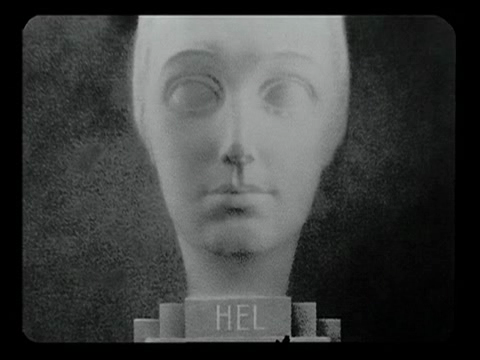
The former lover of both Joh Fredersen and Rotwang. Also the mother of Freder. She died giving birth to him.
- Adapted Out: Every mention of her was removed in the Pollock cut. She was put back again in the Moroder version and the 2001 and 2010 Kino restorations.
- Creator Cameo: Maybe. It has been pointed out that her bust resembles script writer Thea von Harbou (who could, in a way, really be said to be Freder's mother).
- Cynicism Catalyst: In the book, Rotwang claims that her death was what turned him evil.
- The Lost Lenore: To both Fredersen and Rotwang.
- Meaningful Name: She was named after the goddess of death from Norse Mythology. (Not after Hell, as some might think.)
- Posthumous Character: By the time the story begins, she has been dead for many years.
- Shrine to the Fallen: Rotwang has an enormous bust of her hidden behind a curtain in his house, complete with a plaque stating that she belonged to him and that Joh Fredersen was to blame for her death.
- The Unfair Sex: Both Rotwang and Joh Fredersen's mother blame Fredersen for making her leave Rotwang, event though she claimed in her letter that she genuinely liked Fredersen better. Never Speak Ill of the Dead might be a factor.
- Write Back to the Future: In the book, she wrote a letter to Joh Fredersen that was to be read once he had realised the error of his ways, realising that this would be after her death. He finally gets to read it at the very end of the book.
September

The owner of the Yoshiwara nightclub. He is a mysterious character and a somewhat morally dubious one, but he can still be helpful when it comes to giving out information.
- Adapted Out: He does not appear in the movie.
- Fantastic Drug: He hands out one called Maohee to his customers, which lets them experience each other's emotions. He is willing to keep on doing this and even cover up its very existence despite knowing that it can have some nasty side effects if a sufficiently depressed person is hooked up to the Hive Mind.
- Japanese Politeness: He is very polite to Slim, even when he threatens to have the police shut down September's less than legal activities.
- Laser-Guided Amnesia: Uses this to keep his drug a secret. Apparently, every time someone drinks a glass of water or wine (and presumably, any other liquid,) they will instantly forget everything they know about it.
- Mysterious Past: Nobody knows where he comes from, or even why he is called September.
- Non-Specifically Foreign: He seems to be a mixure of several different nationalities. No one In-Universe can guess which ones, and he isn't telling.
- Omniglot: He can speak a number of different languages fluently.
- Twofer Token Minority: He is the only person of colour in the story who is given any focus, and he is said to be of mixed race.
- Violent Glaswegian: It's implied that he's got some Scottish ancestry, and that this is where his barely supressed anger comes from.
- Yellow Peril: Downplayed. He runs a Japanese nightclub, but he is only partially Asian, and he is more of an amoral, greedy businessman than an outright villain. Compared with Joh Fredersen, Rotwang or even Slim, he is completely harmless.
The Monk Desertus
- Played by: Fritz Rasp
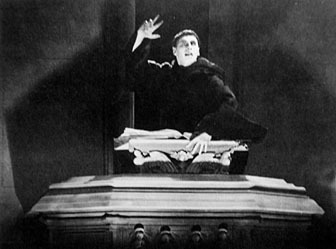
A monk who controls the Gothics and also preaches in the cathedral. He does not like Joh Fredersen, due to his very low opinion of religion, and regularly sends him hate mail.
- Adapted Out: His only scene in the movie was cut for its international release, and is one of the movie's few deleted scenes that is still thought to be missing. A couple of photos are all that remains of Fritz Rasp's portrayal of the character (not counting the later dream scene where the Thin Man turns into him.)
- Composite Character: Maybe. He is played by the same actor who portays the Thin Man, and they both have similar scenes where they warn people about terrible things to come. However, they are never stated to be the same person, and this could just be done to emphasize the similarities between them, to provide some Foreshadowing to Maria's Evil Knock Off, or just to make the dream scene where the Thin Man transforms into the monk easier to film.
- Crucified Hero Shot: Invoked In-Universe during the climax. Desertus leaves his cathedral on a huge cross, carried by his followers. It's not stated whether he actually got himself crucified or not, but it seems disturbingly plausible, given what his followers are doing at the moment.
- Demoted to Extra: Even if you ignore the fact that his scene is missing, his role is still very much reduced in the film, where he comes off like a random paranoid preacher.
- Hijacked by Ganon: He starts out as basically Joh Fredersen's archnemesis. By the climax of the book, he is reduced to being only a minor player in the events.
- Identical Stranger: He looks exactly like the Thin Man, due to being played by the same actor.
- Self-Harm: When they think that the world is ending, his gnostic followers engage in this, giving themselves A Taste of the Lash.
- The End Is Nigh: His one scene in the movie has him preaching at the altar about the upcoming End of the World as We Know It.
- No Name Given: He is only called "The Monk" in the film.
- Ye Olde Butcherede Englishe: Tends to talk like this.
Joh Fredersen's mother

Joh Fredersen's elderly mother. She is trying to act as a voice of reason for her son, but she has been estranged from him after seeing the suffering that he is causing, and his refusal to do anything about it.
- Adapted Out: She does not appear in the movie.
- Antagonistic Offspring: Joh Fredersen is this to her. However, all of her scenes are essentially told from his perspective, making her a Hero Antagonist of sorts.
- Cool Old Lady: She is one of very few people who can make Joh Fredersen feel ashamed, so she certainly counts.
- Friendly Enemy: She and her son are this, to a degree. They are capable of having a perfectly civil conversation, and Joh still has a strong respect for her, but she despises the man he has grown up to be.
- Handicapped Badass: She may be an almost completely paralysed old lady confined to a wheelchair, but her mind and her tongue are still as sharp as ever.
- Keeping the Enemy Close: She isn't an outright enemy, but she's not on Joh Fredersen's side either, and it's implied that this may have been part of the reason why Joh forced her to move into the city.
- Morality Chain: Subverted. She is trying to be this, but Fredersen is to far gone to listen to her advice. This pushes them apart, and they only reconcile after his Heel–Face Turn.
- No Name Given: She is only ever referred to as "Joh Fredersen's mother."
- Parental Substitute: It's implied that she has been a bit of a mother figure for Freder. Especially when his father hasn't been there for him.
- The Unfair Sex: She blames her son completely for seducing Hel and (accidentally) killing her, putting no blame at all on Hel for leaving Rotwang.
The Magician
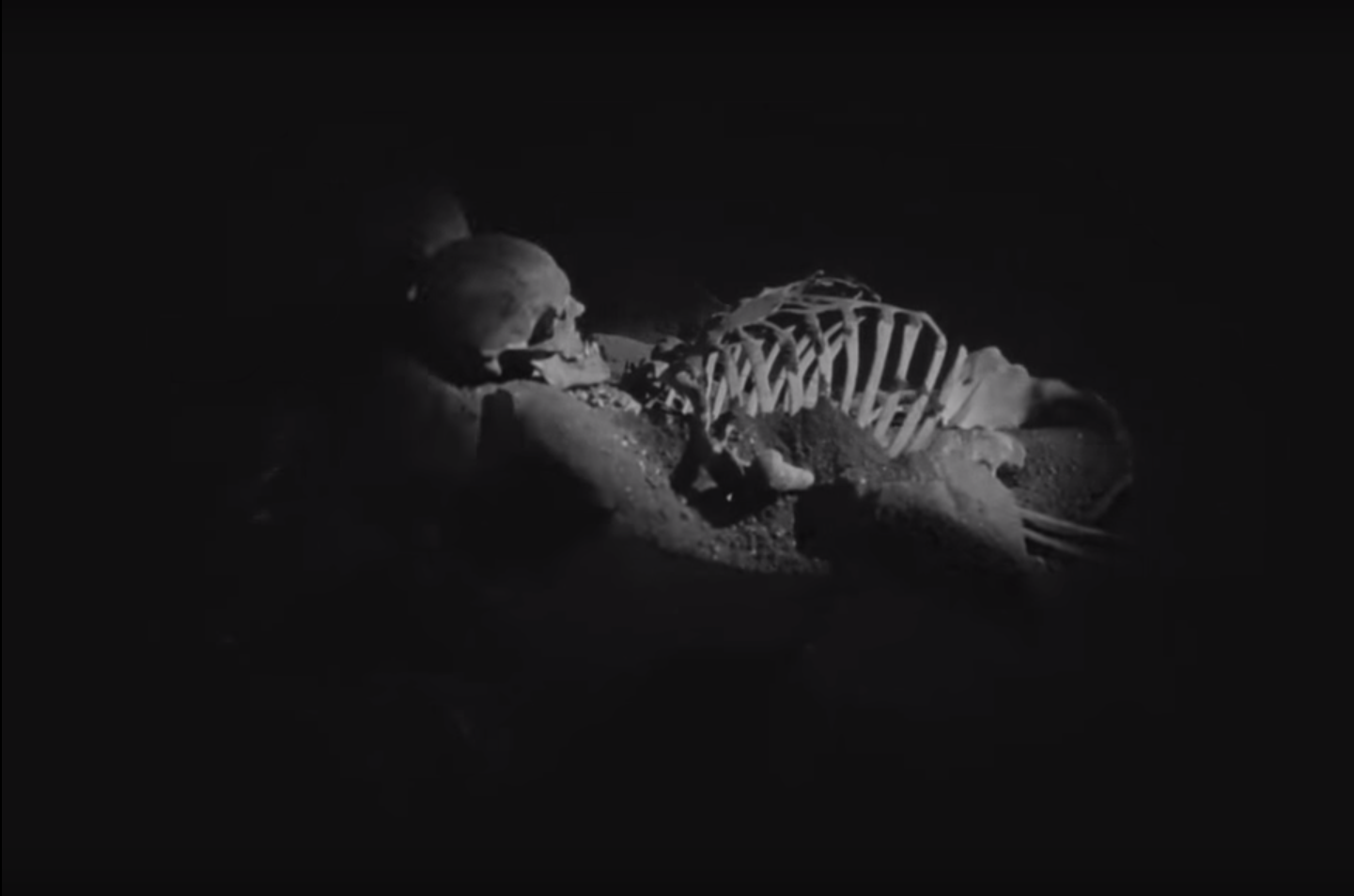
The man who originally built Rotwang's house. Believed to be a powerful wizard, he was feared and hated by his community. One day he simply disappeared, and his house remained empty until Rotwang moved in.
- Adaptational Attractiveness: Inverted. The book implies that his body was relatively well-preserved, as Rotwang can read his facial expression. In the movie, he is a skeleton that doesn't even have a face left.
- Ambiguously Jewish: He was a mystic who put a pentagram - referred to as "The seal of Solomon" In-Universe - on his door. Rotwang outright says that he certainly wasn't a Christian in life.
- Demoted to Extra / Adapted Out: The film keeps the scene where Maria finds his corpse, but doesn't tell us anything about who he was in life. He is briefly mentioned in the Moroder version, but it's still not stated that the skeleton belonged to him.
- Evil Sorceror: He was seen as this by his contemporaries, who accused him of bringing a plague to the town and putting a curse on his house.
- Face Death with Dignity: He seems to have done this, if his calm expression is any indication.
- Heel–Faith Turn: Rotwang believes that he converted to Christianity right before his death.
- Iconic Item: His red shoes. Rotwang only realized who he was because of them.
- Never Found the Body: Subverted. His body was eventually discovered in the catacombs by Rotwang centuries after his death.
- No Name Given: His name seems to have been lost to history.
- Predecessor Villain: To Rotwang,
 at least in theory.
at least in theory.
Jan
- Played by: Olaf Storm
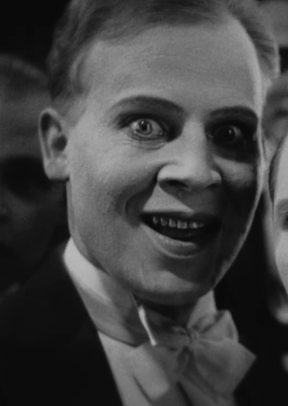
One of Freder's friends from the Sons' Club. He bears witness to the False Maria's dance and is, in the novel, the one who tells Freder about it. He is later killed by the False Maria during the climax. In the movie however, he is killed in a duel by a friend, who later commits suicide out of guilt.
- Cassandra Truth: Freder doesn't believe him when he says that he saw Maria in two places at once. Of course, neither one of them knows about her Doppelgänger.
- Death by Adaptation: He dies earlier in the movie than in the book.
- Demoted to Extra: The movie keeps the scene where he watches the False Maria dance in terror, but his exposition scene is given to Josaphat.
- Determinator: Being burned alive by her doesn't actually stop him from following Futura, still acting like a Loony Fan.
- Disproportionate Retribution: He is brutally killed by Futura for being mildly annoying.
- Forgotten Fallen Friend: Nobody seems to think about him again after his death.
- Kick the Dog: The False Maria kills him For the Evulz.
- Man on Fire: His clothes catch fire when the False Maria hits him with a burning torch. This eventually leads to him plummeting off an elevated walkway, killing him.
- Mr. Exposition: This is essentially his role in the story. He meets Freder and tells him about Futura's dance number and that another friend of theirs has committed suicide.
- Not Named in Opening Credits: The actor playing Jan in the movie is not credited at all (presumably because it was such a small part). However, according to IMDB, he was portayed by Olaf Storm, a Danish silent film actor.

- The Voiceless: The movie doesn't give him a single line of dialogue.
The Master of Cermonies
- Played by: Heinrich Gotho

The man who organises the parties in the Eternal Gardens. When Maria and the children show up, he orders the guards to throw them out. Freder then asks him who she was, to no avail.
- Bald of Evil: He is not really evil, but he acts antagonistically towards Maria and he is balding.
- Berserk Button: He doesn't take it well when the peace is disturbed by working class people.
- Dirty Old Man: He could be interpreted as one, considering that he has a job where he is surrounded by attractive women in skimpy outfits. He also asks one of them to turn around twice to really get a good look at her dress... and also her exposed back.
- Everyone Calls Him "Barkeep": He is only ever referred to by his title, never by his name.
- Grumpy Old Man: He is pretty jovial at first, but he gets quite angry when Maria and the children show up.
- The Jeeves: His role seems to be roughly the same as that of a butler.
- Large Ham: He gets pretty animated when he orders Maria and the children to leave.
- Nerd Glasses: Wears some pretty dorky (but still neat) hexagonal glasses.
- Obsessively Organized: He wants the harem girls to look perfect, and fixes up their make-up himself when he is unsatisfied with it. When things don't go according to plan (i.e. when the uninvited guests show up,) he throws a fit.
- Starter Villain: He's less of an actual villain and more of just an angry old man, but he is the first person Freder meets that shows actual contempt for the workers, which motivates him to travel down to the workers' city.
The Harem Girls
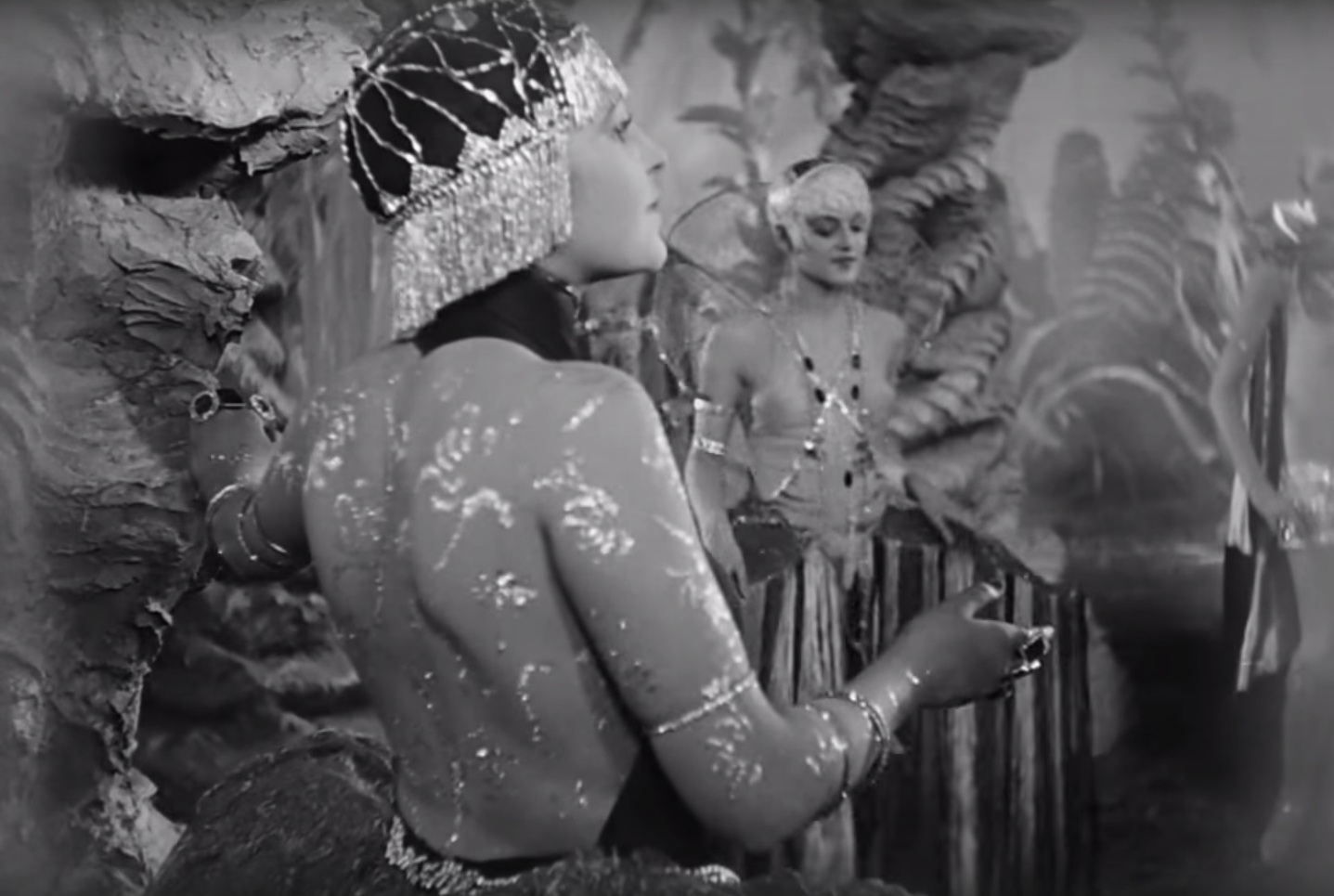
Women specifically trained to serve and entertain the richest young men in the city. Freder is hanging out with one of them when he first meets Maria. In the book, it is stated that they are the ones who takes care of the workers' children after they are taken to the Sons' Club.
- Almost Kiss: Freder is just about to kiss one of them when he is distracted by the arrival of Maria.
- Bowdlerise: Some versions of the movie never states that they are... "pleasure servants" and instead implies that they are simply rich women wearing somewhat risque outfits (for the 20s). The Pollock version notably cuts out the scene where the master of ceremonies asks which one of them who would like to entertain Freder, and changes Maria's line to "These are your brothers and sisters."
- Costume Porn: An almost literal example.
- Good Counterpart: To the False Maria. She tries to drown the workers' children, while they take care of them once they have been saved.
- Happiness in Slavery / Stepford Smiler: An odd combination of both tropes. They are trained to smile all the time, but unlike the workers they don't seem to be miserable or really mind their position, and they share a seemingly genuine laugh with their masters at one point.
- Hooker with a Heart of Gold: Unlike Futura, they don't seem to be particularly bad people.
- Romantic False Lead: The girl Freder almost kisses. They chase each other around in a rather romantic-looking scene, but Freder abandons her as soon as he sees Maria and she never appears again.
- Royal Harem: They are highly trained female servants who are only available to the sons of the richest people in the city. Apparently, they are mostly there as "decoration", but they are also referred to as prostitutes.
- Ms. Fanservice: Their outfits are rather skimpy.
- Naked Freak-Out: Subverted. One of them acts as if she has lost all of her clothes, but she has really just lost her facemask.
Rotwang's servant

A man who seems to work for Rotwang. He appears in only one scene to tell him that Joh Fredersen has arrived.
- Ascended Extra: Well, not really that ascended, but he is given slightly more lines in the Moroder version, where he says "Joh Fredersen wants to speak with you." instead of just "Joh Fredersen."
- Bearer of Bad News: Rotwang clearly sees him like this, as he is on bad terms with Joh Fredersen.
- Canon Foreigner: He never appeared in the novel.
- No Name Given: His name is never mentioned, and his actor isn't credited, either.
- Punch-Clock Villain: Maybe. He never does anything evil, but that might be mostly because he barely does anything in the first place.
- Satellite Character: He pretty much only exists to give Rotwang an Establishing Character Moment where it's shown that he hates Joh Fredersen, and to set up a Description Cut.
- This Is Gonna Suck: He is clearly nervous about telling Rotwang about his guest.
- The Igor: Subverted. He is a servant working for a Mad Scientist, but he isn't a hunchback and his master seems to do most of the work himself.
- What Happened to the Mouse?: He is never seen or mentioned again after his introductory scene.
- What, Exactly, Is His Job?: It's really hard to determine what his job is. He seems like he might be an assistant or a doorman, but later in the movie he neither answers the door for Rotwang or helps him with his experiments.
The Workers
The Workers in general

The underclass who keep the city running. They are locked up in a city they are not allowed to leave and forced to work at Joh Fredersen's machines.
- Ax-Crazy: All of the participants in the revolution.
- Dress-Coded for Your Convenience: Men, women, boys and girls have their own identical, equally plain clothes. The men wear dark uniforms with caps, the women wear simple dresses, the boys wear shirts and pants while the girls wear shirts and skirts.
- Human Sacrifice: They are figuratively slaves whose lives are slowly sacrificed to their gods, the machines.
- Inexplicably Identical Individuals: In the book it is said that they all have the same face. This is probably meant to be symbolic, to show their lack of individuality.
- Mooks: They serve this role for the False Maria (and later Grot) during the climax.
- Morlocks: They seem to be partially based on the Trope Namers. They are still undeniably human, but they tend to act like mindless drones when kept in check, and like brutal savages when they aren't.
- Unwitting Pawn: They are all tricked into destroying the Heart Machine - and by extension, their own city - by Futura.
- You Are Number 6: In the book, they are supposed to have numbers instead of names, but they still have regular names given to them by their parents. In the movie, they seem to have both.
- We Have Reserves: Twelve of them are killed/seriously injured in an explosion at the M-Machine, only to be taken away and immediately replaced with a fresh crew.
- What, Exactly, Is His Job?: We see the men work at the machines, but it's never shown what the women and children actually do in their city. Maria is a priest who preaches sermons, but that probably doesn't count, as they are illegal. The closest thing we get to a mention of it is the False Maria's speech in the book, where the workers say that their wives are starving, that their children are crying and that they are all miserable.
Maria / Mary
- Played by: Brigitte Helm

A worker's daughter who functions as both a leader and a teacher for the workers as well as for their children. She doesn't like the way the city is run, but doesn't want a revolution either. Instead she is waiting for the arrival of someone who can act as a liaison between the workers and elite.
- Action Survivor: She is not quite an Action Girl, but she still has to put up with a lot of danger.
- Composite Character: She combines aspects of Mary, mother of Jesus, and John the Baptist.
- Custom Uniform: She wears a dress that is lighter and slightly more elaborate than the ones worn by the other female workers. Though it's apparently not completely unique, as Rotwang doesn't seem to have any problems finding an identical one for his robot. It could be related to her role as a spiritual leader. On a meta level, it makes her (and her duplicate) easier to spot in crowd scenes.
- Dub Name Change: The Pollock version changes her name to Mary. This might be a form of Cultural Translation, as "Maria" is the German name for the Virgin Mary, whom she is named after.
- Hero with Bad Publicity: She gets blamed for her duplicate's actions, and nearly gets executed for it.
- Holding Out for a Hero: She doesn't want the workers to start a revolution, as she hates violence. Instead, she prefers to wait for a mediator from the upper class who will come to them and make things better. The workers are slowly losing their patience, though.
- Incorruptible Pure Pureness: She is probably the most unambiguously good character in the entire story. Even Freder and Josaphat could be seen as slightly anti-heroic compared to her.
- The Paragon: Her goal is to bring some culture to the workers' lives, teach them about peace and try to improve their conditions peacefully. She is also personally responsible for motivating Freder to become the Mediator.
- Reasonable Authority Figure: She doesn't want a violent rebellion, and would prefer if the workers and the upper class could come to a peaceful compromise.
Georgy 11811 / George
- Played by: Erwin Biswanger
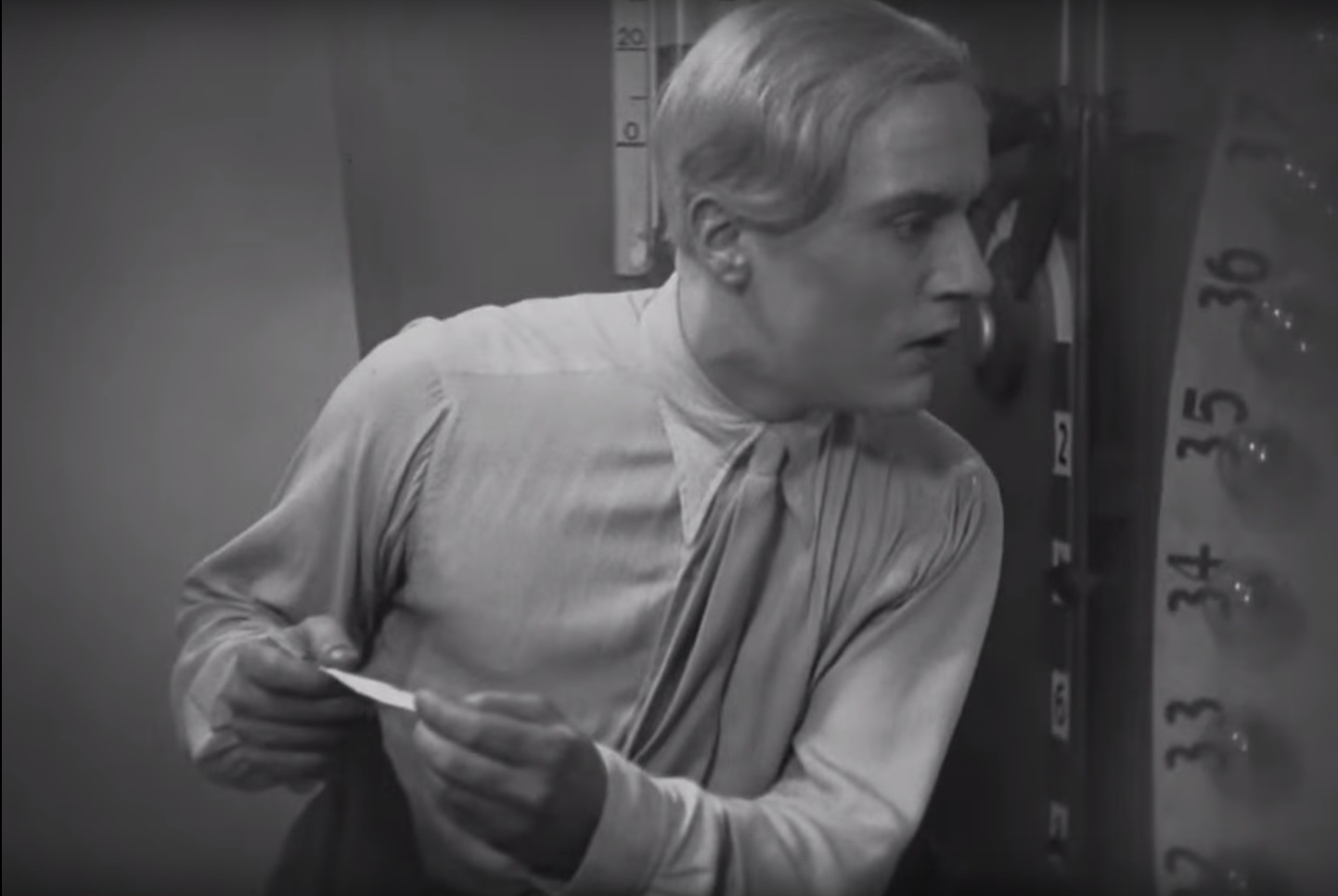
One of the workers who keeps the Paternoster Machine running. Freder trades places with him and lets him leave the city of the workers. However, he is captured by the Thin Man and gets sent back down again.
- Adaptation Personality Change: In the book, he is a Talkative Loon who is clearly going crazy. In the movie he is a pretty normal guy who simply has an exhausting job.
- Assimilation Backfire: In the book, he ingests a drug that hooks him up to a Mind Hive designed to make all of it's participants experience each others happiness. However, he is so miserable that he instead causes everyone else to feel mental and physical pain.
- Beauty Is Never Tarnished: He has very nice hair for a poor worker performing slave labour in an underground city. This might be an Enforced Trope, as he wouldn't be able to impersonate a member of the upper class otherwise.
- Cloud Cuckoolander: He believes that he is a machine, or perhaps Satan, and that his machine, or his boss, is God, or possibly that his machine is his boss.
- Death by Adaptation: He is killed by the same knife wound in both the book and the movie, but in the book, he survives long enough to leave the room and follow Freder and Josaphat for a while. In the movie, he dies in less than a minute.
- Demoted to Extra: The scene where he visits Yoshiwara was completely removed in the Pollock version. Averted with the 2010 restoration, which put his scenes back into the story.
- Devil Complex: At one point in the novel, he claims to be the Devil. Unusually for this trope, this isn't meant as a Badass Boast. Instead, he means that he is in great pain and will share it with everyone.
- Distinctive Appearances: He is the only blond male worker that we see.
- Dub Name Change: The Pollock version changes his name to George.
- Heroic Sacrifice: He throws himself in front of a knife meant for Freder and suffers a fatal stab wound.
- Prince and Pauper: He briefly trades places with Freder by switching clothes with him.
- Redemption Equals Death: He was never evil per se, just self-serving and risk-taking, but he did betray Freder's trust by going to Yoshiwara instead of going to Josaphat's apartment as he promised. This indirectly leads to Josaphat being assaulted by the Thin Man. Georgy more then makes up for this when he sacrifices his own life to save Freder's.
- Sanity Slippage: In the novel, it's clear that constantly working on the Paternoster Machine has not been good for his sanity.
Grot / Number 7
- Played by: Heinrich George
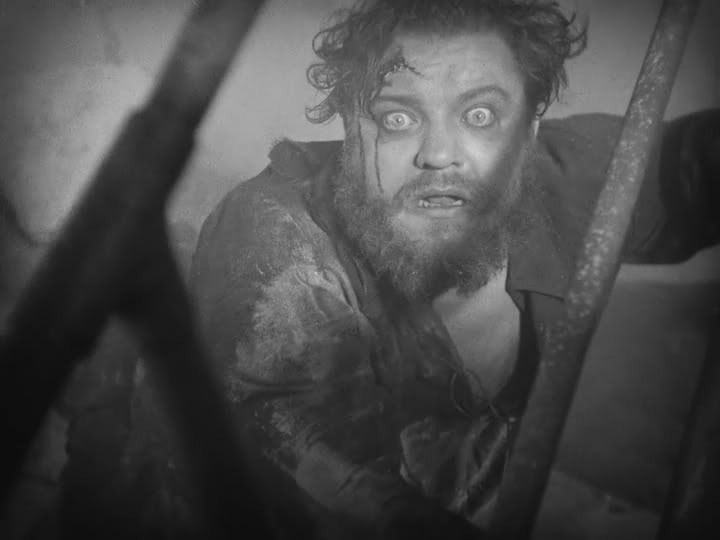
The foreman of the workers and the guardian of the Heart Machine. He tries to defend the Heart Machine from the workers during the revolution, but fails. Later, he leads them in their search for the False Maria.
- Anti-Hero: He is outright gleeful about executing a woman who can't defend herself in a really painful way, and he would have likely done the same thing to Joh Fredersen if he hadn't been stopped. However, he considered both of them to be major Asshole Victims who truly deserved it.
- Badass Normal: Takes down a robot with nothing but brute strength.
- The Brute: Played with. He doesn't actually support Joh Fredersen's plan and tries to stop Futura from destroying the city, but he is working for Fredersen and he does oppose the heroes of the film, so he counts.
- Go Through Me: He throws himself in front of the Heart Machine, armed only with a wrench, ready to defend it from a huge crowd of workers all by himself. They actually hesitate for a while, but they attack him once Futura gives the order.
- Hero Antagonist: His goal is simply to avenge the death of the workers' children. He just doesn't know right away that it wasn't the real Maria who told the workers to destroy the Heart Machine, or that Freder, Maria, and Josaphat have already brought the children to safety.
- He Who Fights Monsters: He hates the False Maria for being a sadistic murderer, and ends up murdering her while showing signs of sadism himself.
- Large and in Charge: He is the foreman of the workers, and by far the biggest one of them.
- No One Should Survive That!: The workers knock Grot out and dump him at the bottom of the stairs leading up to the Heart Machine. As it overloads, he barely avoids being fried by the electric arcs grounding out everywhere and crushed by the debris falling from the ceiling.
- Only Sane Man: He points out to both Joh Fredersen and the workers that destroying the Heart Machine would have disastrous consequences. Unfortunately, they don't listen to him.
- Reasonable Authority Figure: Well, more reasonable than Joh Fredersen or the Machine Man, at any rate.
- Revenge by Proxy: In the book, he tries to kill Freder at one point, as killing Joh Fredersen's son would be the second best thing to killing the man himself. It makes a bit more sense when you consider that, as far as Grot knows, Joh Fredersen is indirectly responsible for the death of his daughter.
- You Are Number 6: In the Pollock version, he is given a number instead of a name, much like Georgy.
Hallucinated/ Imagined Characters
The Machine Gods
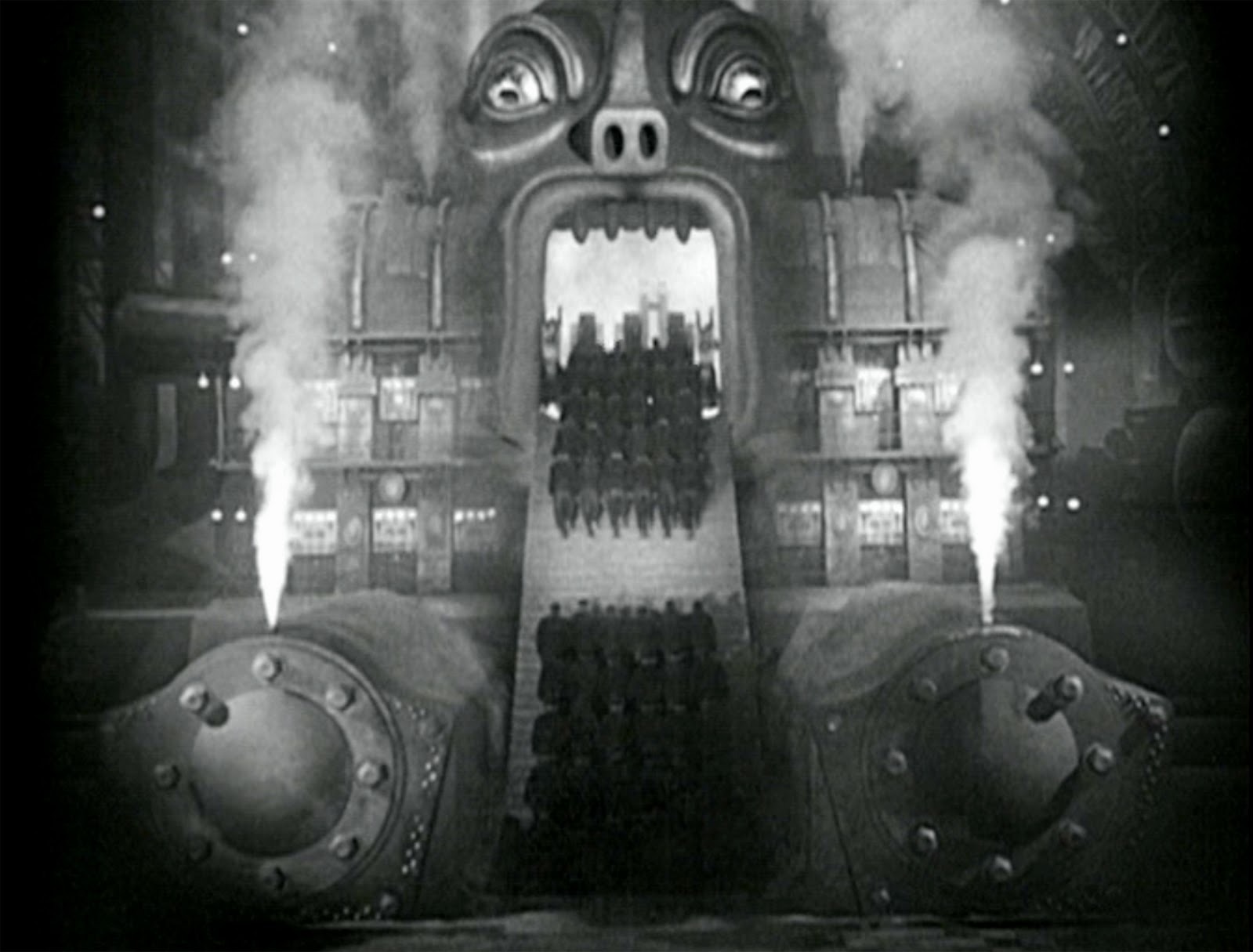
Gods from several different religions that the machines are compared with. The workers are seen as their human sacrifices that are killed to appease them.
- Adapted Out: Moloch is the only one of them to appear in the movie.
- Crossover Cosmology: Their numbers include the Ammonite god Moloch, Thor from Norse Mythology, and Ganesha from Hinduism.
- The Dreaded: Freder is quite frightened of them.
- Fire and Brimstone Hell: The inside of the Moloch Machine in the movie, where it looks like an enormous oven.
- God of Evil: What else do you call "gods" that constantly require humans to basically be tortured?
- Kill the God: They are destroyed by the workers towards the end of the story.
- Machine Worship: Some of the workers have literally started to worship the machines. Freder, on the other hand, acts more like a Nay-Theist towards them.
- Powered by a Forsaken Child: More like "Powered by a forsaken working class."
- To Serve Man: The movie shows Moloch literally devouring the workers.
-
 Unexpected Character: In the movie. An Ammonite god is probably not something you would expect to see in a science-fiction film (albeit as a vision.) Slightly less so in the book, which has obvious religious symbolism from the get-go, even before Moloch shows up.
Unexpected Character: In the movie. An Ammonite god is probably not something you would expect to see in a science-fiction film (albeit as a vision.) Slightly less so in the book, which has obvious religious symbolism from the get-go, even before Moloch shows up.
The Creative Man
- Played by: Fritz Alberti

A character from Maria's retelling of The Tower of Babel. He was the one who suggested building the tower. Later, he oversaw its construction.
- Big Bad: Of Maria's "Tower of Babel" story.
- History Repeats: His story is Maria's attempt to avert this trope.
- Jacob Marley Warning: Sort of. Maria uses his story as a way to warn the workers of what could happen if they don't find a mediator.
- Light Is Not Good: From the point of view of his workmen.
- No Celebrities Were Harmed: In-Universe, it's likely that he was a thinly veiled Expy of Joh Fredersen.
- No Name Given: His name is never revealed. Considering that he is just a character in a (not quite accurate) retelling of a story from The Bible, he might not even have one.
- Not Named in Opening Credits: His character name just appears in the opening with no mention of the actor who played him.
- Turned Against Their Masters: He found himself on the recieving end of this. It's strongly implied that his workers killed him.
- Visionary Villain: Though perhaps more uncaring than outright villainous.
- 0% Approval Rating: The workers quickly grew to hate him and eventually tore down the tower.
Death and the Seven Deadly Sins

The Anthropomorphic Personifications of, well, Death and the Seven Deadly Sins. They stand as statues in the cathedral, and appear in one of Freder's nightmares.
- Attack of the 50-Foot Whatever: In the novel, Death grows into a giant large enough to sit down on top of the New Tower of Babel. In the film, Freder hallucinates that Death becomes tall enough to tower over the cathedral's immense arched doorway.
- Dem Bones: As in many other stories, Death is portrayed as a living skeleton.
- Everything Is an Instrument: Death uses a bone as a flute.
- Exactly What It Says on the Tin: All of their statues have helpful labels above them, making it clear to both Freder and the audience who they are.
- Living Statues: They take the form of their statues from the cathedral, which Freder visited earlier.
- Maybe Magic, Maybe Mundane: In the book, it is stated that Freder returned to the cathedral and found the statue of The Grim Reaper missing, as if he hadn't returned from his nightly killing spree. Though he points out that it may just have been removed for repair.
- Not Named in Opening Credits: Their actors are not credited.
- Scary Black Man: The Seven Deadly Sins, before they reveal their true form.
- Silent Antagonists: They are not given any dialogue.
- Sinister Scythe: Carried by The Grim Reaper, of course.
The Flood
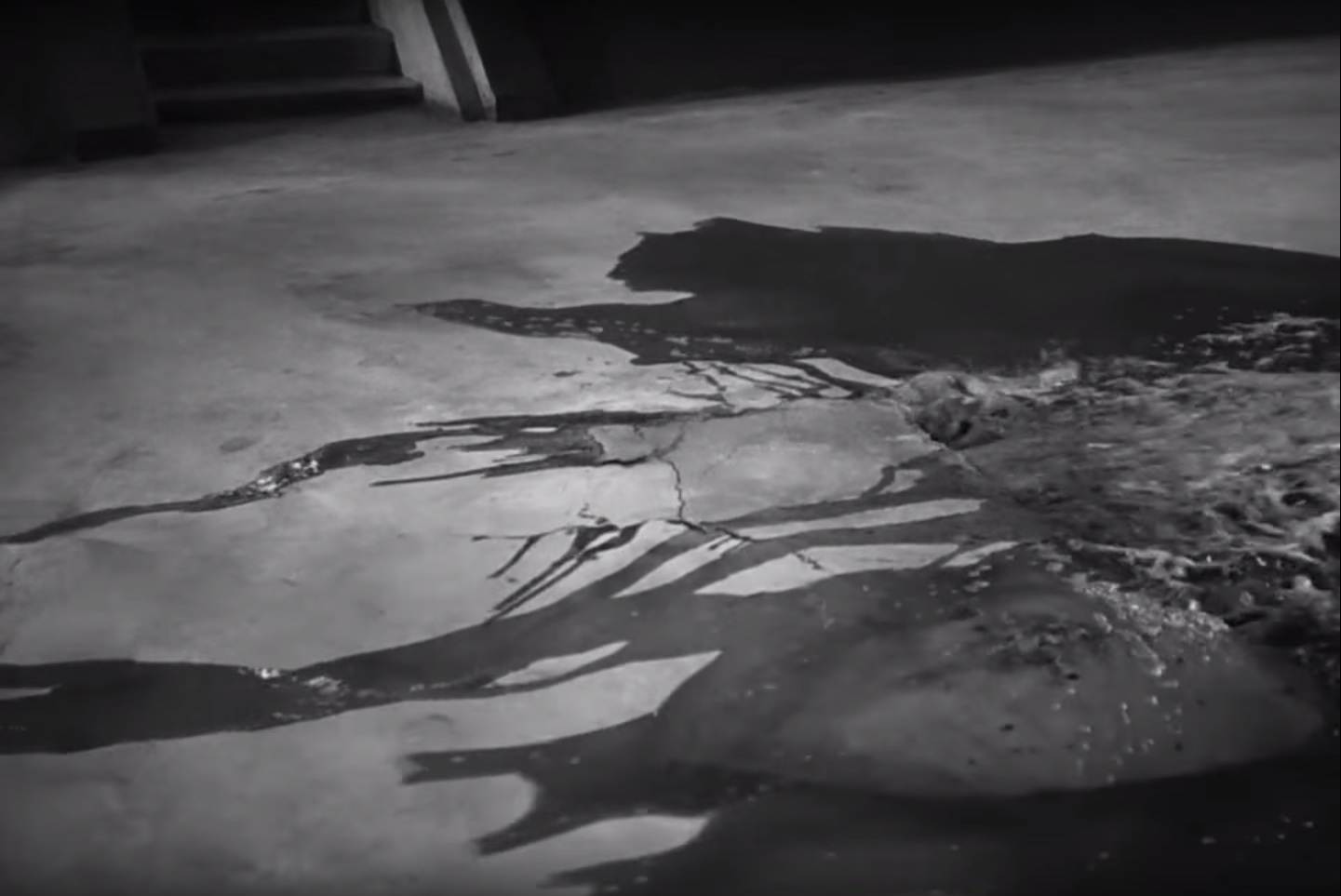
The water that floods the Worker's City at the climax. In the book, Maria hallucinates that it starts talking to her.
- Anthropomorphic Personification: It seems to represent Maria's fears. (Namely, of being violated, murdered and failing to save people whose lives she was trying to protect.
- Dem Bones: It claims that the dead are rising from their graves.
- Does This Remind You of Anything?: It boasts to Maria of how it's stroking her ankles, and says that it's looking forward to embracing her hips and breasts.
- God Is Evil: It claims that God doesn't care about the people who pray to Him, and hasn't done so since He flooded the world in the Book of Genesis.
- I Have You Now, My Pretty: It seems to be lusting for Maria even more than Rotwang.
- Imaginary Enemy: Maria imagines it taunts her.
- Loves the Sound of Screaming: Implied. It mentions hearing the screams of every mother who drowned when it covered the entire planet in The Bible, and it doesn't seem all that bothered by it.
- Nature Adores a Virgin: Played With. It seems to be outright lusting after Maria, and wants to "correct" the fact that she is a virgin by itself before killing her.
- Soft-Spoken Sadist: Comes off like one.
- The Great Flood: It claims to be THE Great Flood from The Bible, having returned to cause more death and misery.
- Would Hurt a Child: It says that it will kill all of the children in the City of the Workers, and mocks Maria's attempts at saving them.

